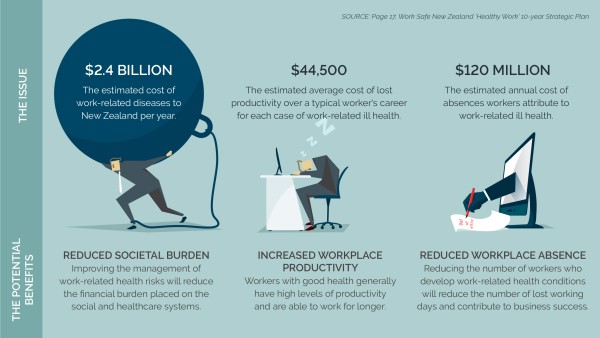Baker Tilly Staples Rodway one of NZ’s top graduate employers
We’ve been named Number 22 on a list of New Zealand’s top 100 grad employers. The recognition comes...
Work Safe estimate that in New Zealand each year 600 to 900 people die of work-related diseases and around a further 30,000 people develop serious but non-fatal work related health conditions. These deaths and serious ill-health conditions are not inevitable and are preventable in the vast majority of cases.
Time to read: 3 mins
In a recent survey, Southern Cross and Business New Zealand found that workers have experienced sharp increases in workplace stress over the past two years. Following their Wellness in the Workplace survey, the stress levels of 31.2% of employees have increased compared with only 8.3% of employees who have seen a decline in their stress levels. The survey found that those who reported an increase in workplace stress attributed this to excessive workloads, pressure to meet work targets, management style and long hours.
Positive wellbeing is not just about having a work-life balance; whilst that is important it is also about enjoying the work you do and being positively stimulated and challenged, being set realistic targets, receiving regular constructive and positive feedback and feeling valued and empowered the list goes on. Have this all in check and the rewards the employer reaps are magnificent! Employees are more likely to be highly productive, ‘go the extra mile’, be engaged, have great attendance at work and be an ambassador for their employer to the external world.
What is work stress? It is the adverse reaction people have to excessive pressures or other type of demand placed on them at work. Stress is usually not an illness it is a state of mind. However, if stress becomes too excessive and prolonged, mental and physical illness may develop (Source: HSE UK).
Many of the outward signs of stress in individuals should be noticeable to you. Look in particular for changes in a person’s mood or behaviour, such as deteriorating relationships with colleagues, irritability, indecisiveness, lateness, absenteeism or reduced performance. Those suffering from stress may also smoke or drink alcohol more than usual or even turn to drugs. They might also complain about their health: for example they may get regular headaches or have difficulty in sleeping.
In 2016, Work Safe New Zealand published their 10 year strategic plan for work related health. ‘Healthy Work’ outlines their vision for a New Zealand in which everyone who goes to work comes home not just safe but healthy too! It is unacceptable and morally wrong that illness and in some cases even death continues to happen among New Zealand workers, especially when it is preventable.
Work Safe are confident that improved management of work-related health risks would bring multiple benefits to New Zealand, including those set out in the infographic below.
It all starts and ends with your organisation’s culture.
Contact one of our HR Consultants to discuss your organisational development needs or Wellbeing intervention initiatives.

Our website uses cookies to help understand and improve your experience. Please let us know if that’s okay by you.
Cookies help us understand how you use our website, so we can serve up the right information here and in our other marketing.